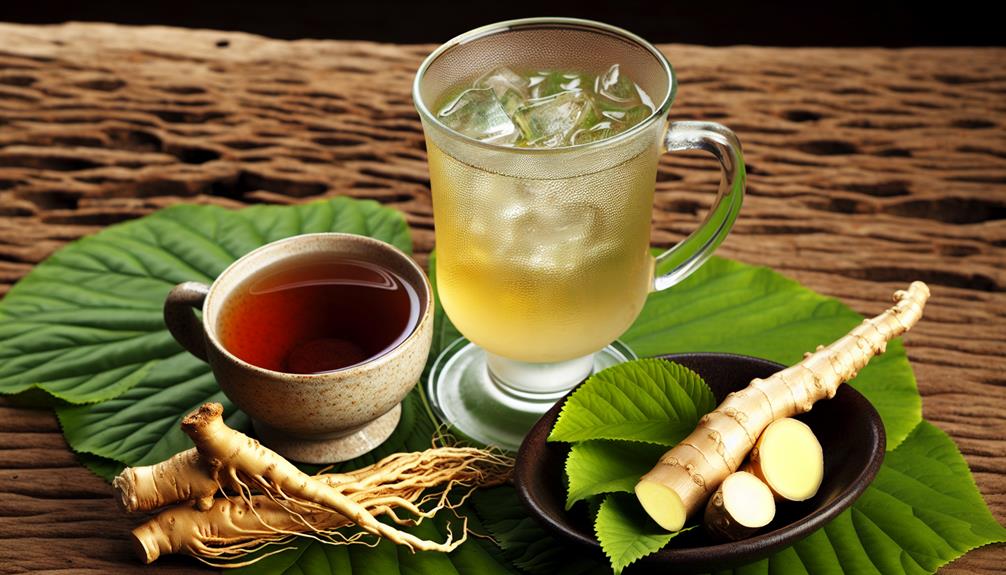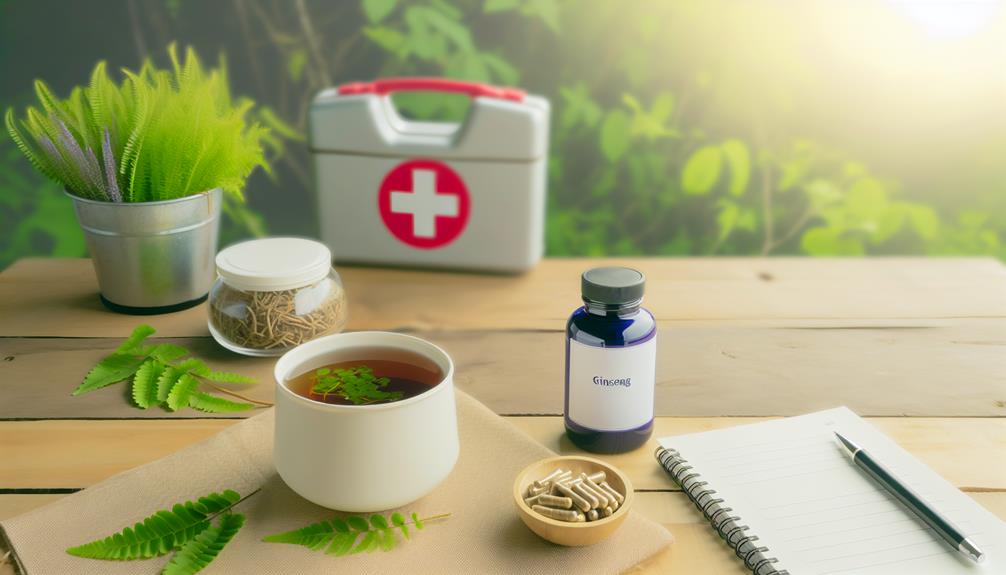Incorporate ginseng into your daily routine by starting with a morning ritual like ginseng tea for a gentle energy boost or adding powdered ginseng to smoothies or oatmeal for sustained vigor. Use ginseng-infused honey in your beverages or on toast for extra health benefits. Include fresh or powdered ginseng in soups and stir-fries to enhance meal nutrition. Don't forget ginseng supplements, available in various forms, for convenience and precise dosages. Always consult your healthcare provider first to determine the best form and dosage for your needs. Stick around and you'll uncover even more ways to benefit from ginseng.
Understanding Ginseng Varieties
When it comes to ginseng, understanding the different varieties is essential for making the most of this powerful herb.
Asian ginseng (Panax ginseng) is known for its stronger effects, offering a robust boost to energy and stamina. Within this category, Korean red ginseng stands out due to its unique processing method; it's steamed and dried, which enhances its medicinal qualities and ginsenosides content.
In contrast, American ginseng (Panax quinquefolius) is milder and often prized for its calming properties, typically used in its raw or powdered form.
Siberian ginseng, while not a true ginseng, contains eleutherosides and is sometimes used to promote overall health. However, it lacks the ginsenosides found in true ginseng varieties, making its benefits somewhat different.
Wild ginseng is nearly extinct due to overharvesting and is highly regulated. It's rare and often considered superior but is difficult to obtain.
Cultivated ginseng, grown under controlled conditions, offers a more accessible alternative.
You'll also find ginseng classified based on processing: fresh ginseng (susam) is raw, white ginseng (baeksam) is peeled and dried, and red ginseng is steamed and dried, which further enhances its potency.
Choosing the Right Form
Selecting the right form of ginseng can be essential for achieving your health goals. Ginseng comes in various forms like raw ginseng, powdered extracts, capsules, and ginseng teas, each suited to different needs.
Raw ginseng and concentrated teas provide potent benefits, ideal if you're looking for strong, immediate effects. On the other hand, capsules and powdered extracts offer convenience and precise daily dosage, generally between 200-400 mg. These forms are perfect for those who prefer a straightforward supplementation method.
Ginseng teas are the mildest option, making them suitable for beginners or those seeking a gentle daily supplement. If you're looking to add ginseng to your diet seamlessly, consider powdered extracts, which can be mixed into smoothies or food for a stronger effect.
For enhanced absorption and potency, fermented ginseng is a unique choice that offers maximum effectiveness.
Before starting any ginseng regimen, it's wise to consult with your healthcare provider. They can help determine the best form for your individual health needs, especially if you have underlying conditions or are on medication.
Choosing the right type of ginseng can make all the difference in meeting your health goals.
Morning Ginseng Rituals

Kickstart your day with a cup of ginseng tea to boost your energy and focus.
Enhance your breakfast by mixing ginseng powder into your smoothie or oatmeal for sustained vigor.
For a complete morning ritual, consider adding ginseng-infused honey to your skincare routine and beverages, supporting both your immune system and overall well-being.
Ginseng Tea Benefits
Starting your day with a cup of ginseng tea can be a game-changer, offering a natural way to boost your energy and cognitive function. Ginseng tea, made from dried ginseng root, is an excellent addition to your morning routine. It's rich in ginsenosides, which can help regulate blood sugar levels and enhance your immune system. This means fewer colds and more stable energy levels to keep you going throughout the day.
Not only does ginseng tea help boost energy levels, but it also improves cognitive function, making you more alert and focused. If you're looking to reduce fatigue and improve your emotional well-being, a morning cup of ginseng tea might be just what you need.
Here's a quick look at the benefits:
| Benefit | Description | How to Enjoy |
|---|---|---|
| Boost Energy Levels | Enhances physical and mental stamina | Steep 1-2 grams of dried ginseng root |
| Improve Cognitive Function | Enhances alertness and focus | Use ginseng tea bags in hot water for 5-10 minutes |
| Regulating Blood Sugar | Helps maintain stable energy levels | Drink daily for best results |
| Immune System | Strengthens defense against colds | Traditional herbal use |
| Reduce Fatigue | Promotes emotional well-being and productivity | Make it a morning ritual |
Incorporating ginseng tea into your morning routine can set a positive tone for the rest of your day.
Morning Skincare Routine
Incorporating ginseng into your morning skincare routine can be a game-changer for achieving radiant, youthful skin. Start by applying a ginseng-infused serum, which enhances collagen production and improves skin elasticity thanks to the ginsenosides in ginseng. This powerful serum sets the stage for a glowing complexion.
Next, hydrate and nourish your skin with a ginseng-based moisturizer. Not only does it provide essential hydration, but it also reduces puffiness and inflammation, leaving you with a refreshed appearance all day long. This step guarantees your skin remains supple and well-moisturized.
Don't forget the delicate eye area. Use a ginseng eye cream to target dark circles and fine lines. Ginseng's ability to boost circulation helps to brighten and rejuvenate this sensitive part of your face, giving you a more youthful look.
For an added antioxidant boost, consider sipping on ginseng tea during your morning ritual. This not only energizes you but also provides hydration from within.
Breakfast Enhancements
Transform your morning routine by integrating ginseng into your breakfast for an energizing start to the day.
Begin with a warm cup of ginseng tea. Simply steep 1-2 grams of dried ginseng root in hot water for about 10 minutes. This mild beverage can provide a gentle energy boost and enhance cognitive function.
For a more substantial breakfast, try adding ginseng powder to your smoothie or oatmeal. A dose of 200-400 mg can elevate both the flavor and nutritional value. Not only will this support your immune function, but it will also help regulate blood sugar levels, providing sustained energy throughout the morning.
If you prefer a quicker option, mix ginseng extract into your breakfast shake. This concentrated form of ginseng delivers a potent dose, offering quick energy and improved mental clarity.
Another delightful way to incorporate ginseng is by using ginseng-infused honey as a natural sweetener for toast or yogurt. This combines the health benefits of honey with the adaptogenic properties of ginseng.
Lastly, prepare a delicious bowl of ginseng-infused oatmeal by cooking your oats with a teaspoon of ginseng powder. This hearty meal can help regulate blood sugar and sustain your energy levels all morning.
Adding Ginseng to Meals
Adding ginseng to your meals can be a simple yet effective way to boost both flavor and nutrition. Start by incorporating powdered ginseng root into your smoothies or oatmeal. This not only enhances the taste but also provides a nutritional boost with active compounds known as ginsenosides, which offer numerous health benefits.
For a traditional twist, try adding sliced or diced fresh ginseng to soups like samgye-tang (ginseng chicken soup). This method enhances both flavor and health benefits, making your meal both delicious and nutritious.
Alternatively, incorporate ginseng into your stir-fries by adding ginseng powder or slices to your vegetable and protein mix. This promotes better circulation and energy levels, making your meals more invigorating.
You can also infuse oils with ginseng for cooking or salad dressings. This adds a unique flavor while providing potential health benefits associated with its antioxidant properties.
Here are some ideas to get you started:
- Smoothies and Oatmeal: Add powdered ginseng for a nutritional boost.
- Soups: Use sliced fresh ginseng for enhanced flavor and health benefits.
- Stir-Fries: Incorporate ginseng powder or slices for better circulation and energy.
Ginseng in Beverages

While adding ginseng to meals offers numerous health benefits, beverages are another fantastic avenue to explore. Ginseng-infused tea, known as insam cha, combines the root's health benefits with hot water, creating a soothing beverage rich in antioxidants that may boost energy.
If tea isn't your choice, consider adding ginseng to your morning coffee or latte. This unique twist on traditional caffeine drinks may enhance energy and focus without the jitters.
For those who prefer cold drinks, ginseng can be steeped in cold water or combined with fruit juices to make a revitalizing ginseng lemonade, promoting hydration along with its health benefits.
Smoothies and protein shakes are perfect for incorporating ginseng's adaptogenic properties, helping your body cope with stress and fatigue while boosting the nutritional profile of your drink.
Commercial ginseng energy drinks are also an option, often marketed for their stamina-enhancing properties. However, always check the ingredient lists for added sugars and fillers to verify you're getting the most benefits.
Ginseng Supplements Guide
Ginseng supplements offer a convenient way to incorporate the benefits of this powerful root into your daily routine. Available in forms like capsules, powders, extracts, and herbal teas, ginseng supplements provide flexibility for various preferences. Typical dosages range from 200 mg of extract to 1-2 grams of raw root daily, guaranteeing you can find the right fit for your needs.
To guarantee consistent potency and efficacy, look for standardized extracts containing 4-7% ginsenosides. This standardization helps you know exactly what you're getting in each dose. Cycling ginseng use, by taking it for 2-3 weeks followed by a break of 1-2 weeks, can optimize benefits and reduce tolerance.
When choosing ginseng supplements, consider the following:
- Quality Control: Opt for reputable brands that adhere to strict quality control standards and clearly label ginsenoside content.
- Healthcare Provider: Always consult your healthcare provider before starting ginseng, especially if you're on medications like blood thinners or diabetes drugs, to avoid potential interactions.
- Form Options: Explore various forms such as capsules, extracts, and herbal teas to find what suits your lifestyle best.
Safety and Precautions

Before adding ginseng to your routine, consult with your healthcare provider, especially if you're pregnant, breastfeeding, or have conditions like diabetes or hypertension.
Be mindful of potential side effects such as insomnia and gastrointestinal issues, and watch for drug interactions, particularly if you're on blood thinners or diabetes medications.
Always buy from reputable sources to guarantee product quality and safety.
Potential Side Effects
When incorporating ginseng into your routine, it's important to be aware of potential side effects. While ginseng offers various benefits, it can also cause issues such as headaches, digestive problems, insomnia, and skin rashes.
Before adding it to your regimen, consult a healthcare professional, especially if you're pregnant, breastfeeding, or considering it for children.
Ginseng can interact with certain medications, increasing risks such as bleeding or altered blood sugar levels. Consequently, it's vital to discuss its use with your healthcare provider to avoid complications.
To maximize the benefits and minimize side effects, consider cycling your ginseng intake. A common approach is using it for 2-3 weeks, followed by a 1-2 week break. Additionally, due to variability in supplement quality, always purchase ginseng from reputable sources.
Here are some key points to keep in mind:
- Consult a healthcare professional: Important if you're pregnant, breastfeeding, or on medications.
- Be aware of side effects: Monitor for headaches, digestive issues, insomnia, and skin rashes.
- Purchase quality supplements: Verify you're getting a reliable product by buying from reputable sources.
Drug Interactions
Often, it is vital to understand how ginseng might interact with your current medications before adding it to your routine. Ginseng can have significant drug interactions, and knowing these is important for your safety and well-being.
If you're on anticoagulant medications like warfarin, be cautious. Ginseng may reduce their blood-thinning effects, increasing the risk of clotting. Additionally, combining ginseng with sedative medications might enhance drowsiness or sedation, so use it carefully.
Diabetic patients should be particularly vigilant. Ginseng can lower blood sugar levels, necessitating close monitoring and possible adjustments in your diabetes medications. If you're taking medications for high blood pressure, ginseng's additive effects could potentially lead to excessively low blood pressure. Always consult your healthcare provider before making changes.
Pregnant or breastfeeding women, and children, should avoid ginseng, as there's insufficient research on its safety in these groups. Prioritizing your health means understanding these interactions and taking the necessary precautions.
| Medication Type | Potential Interaction | Recommendation |
|---|---|---|
| Anticoagulant (e.g., warfarin) | Decreased blood-thinning effect | Consult your healthcare provider |
| Sedative | Increased drowsiness/sedation | Use with caution |
| Diabetes | Lowered blood sugar levels | Close monitoring & possible adjustments |
Frequently Asked Questions
How Do You Take Ginseng Daily?
You can take ginseng daily by choosing capsules, powders, or extracts. Try ginseng tea for a soothing drink. Take it in the morning, cycle usage, and always buy from reputable sources. Consult your healthcare provider first.
Is Drinking Ginseng Every Day Good?
Drinking ginseng daily can offer benefits like improved cognitive function and increased energy. However, you should be cautious, as overuse may cause side effects. Always consult your healthcare provider before starting a daily ginseng regimen.
Why Can't You Take Ginseng Every Day?
You can't take ginseng every day because it can cause hormonal imbalances, insomnia, headaches, and digestive issues. Cycling its use helps maintain effectiveness and reduces risk. Always consult your healthcare provider, especially if you're on medications.
How Is Ginseng Best Taken?
You should take ginseng in a form that suits your lifestyle, like capsules, powders, teas, or extracts. Start with a dosage of 200-400 mg daily and remember to cycle its use for maximum effectiveness.
Conclusion
Incorporating ginseng into your daily routine can be simple and rewarding. Whether you choose to start your day with a morning ritual, add it to your meals and beverages, or take it as a supplement, ginseng offers numerous health benefits. Remember to select the right variety and form that suits your lifestyle. Always prioritize safety and consult with a healthcare professional if needed. Embrace ginseng and enjoy its positive impact on your well-being!


